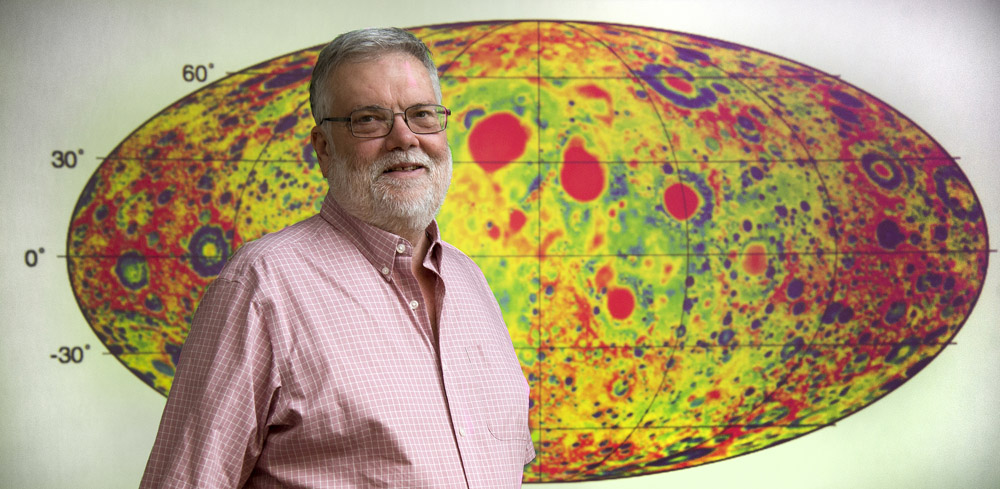June 16, 2023
Gravity Man
Originally published June 1, 2013

Jay Melosh and GRAIL gravity map; photo by Mark Simonds, Purdue University
The paths of the first Lunar Orbiters showed that the Moon's gravity field was lumpy - the orbiters were pulled closer to the lunar surface when passing over impact basins. These mass concentrations (mascons) were proposed to result from impact-induced upward flow of the dense lunar mantle under the basin, along with the 2-5 km thickness of mare lava. This explained how the excavation and removal of material from the lunar crust - which caused a mass deficit - ended up being a mass excess. Now Jay Melosh and a team including nearly every geophysicist who has recently worked on mascons, have put together a detailed mascon model that matches the very high quality gravity data from the GRAIL spacecraft and the excellent topography from the altimeter on the Lunar Reconnaissance Orbiter. They used the output from a sophisticated computer code that simulated the few hours of impact and excavation of a basin, as input for a second sophisticated finite element code that modeled the millions of years modifications of the crust and mantle. The team's findings in general confirm the earlier explanation with much better understanding of physical processes. Forming a mascon requires a relatively high thermal gradient so the mantle can deform by flowage. The surrounding crust also has to be strong enough to accept the annular pile of ejecta that also forces the lower crust down into the transient impact cavity. Pushing from the exterior inward elevates the basin floor. The model is frankly complex and hard to fully understand. One unexpected feature of the new model is that the mantle extensively melts, and in the case of Humorum the melt extends to the surface, which was later modified by isostacy and by emplacement of mare basalts. However, it seems strange that the formation of a large crater like Gassendi apparently did not excavate mantle rocks.
Chuck Wood
PS - LPOD publishes too few pictures of folks who actually do the intellectual work that results in gravity maps, great images and refined theories. Without people like Jay the maps would just be pretty pictures.
Technical Details
Science magazine abstract
Yesterday's LPOD: Concentric Confusion
Tomorrow's LPOD: Cookie Dough Domes
COMMENTS?
Register, Log in, and join in the comments.



